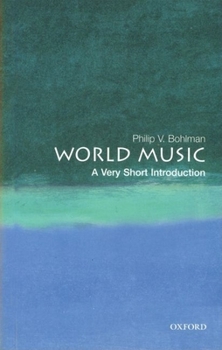World Music
(Part of the Oxford's Very Short Introductions series Series and Very Short Introductions (#65) Series)
Select Format
Select Condition 
Book Overview
World Music draws readers into a remarkable range of historical encounters, in which music had the power to evoke the exotic and to give voice to the voiceless. In the course of the volume's eight chapters the reader witnesses music's involvement in the modern world, but also the individual moments and particular histories that are crucial to an understanding of music's diversity. This book is wide-ranging in its geographical scope, yet individual chapters provide in-depth treatments of selected music cultures and regional music histories. The book frequently zooms in on repertoires and musicians--such as Bob Marley, Dana International, Bartok, and Nusrat Fateh Ali Khan--and attempts to account for world music's growing presence and popularity at the beginning of the twenty-first century.
Format:Paperback
Language:English
ISBN:0192854291
ISBN13:9780192854292
Release Date:August 2002
Publisher:Oxford University Press, USA
Length:144 Pages
Weight:0.90 lbs.
Dimensions:0.5" x 4.5" x 6.8"
Customer Reviews
2 ratings
Musical Globalism or Globalization?
Published by Thriftbooks.com User , 18 years ago
Philip V. Bohlman is a professor of musicology and ethnomusicology at the University of Chicago, an institution reknowned for its foundational works in Anthropology and Ethnomusicology. Being the nature of interdisciplinary ethnomusicologgical research, the book covers areas of study including Musicology, Anthropology, Sociology, History, Political Science, Economics and Philosophy. He begins by expressing the limitations inherant in approaching a global phenomenon with only 150, 4"x7" pages. The reader is consistently reminded of the authors initial disclaimer when reading two paragraphs into an intriguing topic, and finding that it ends there. Nevertheless, Bohlman presents a myriad of ways of approaching and interpretating the global phenonemon known as "world" music. He focuses on topics including: the history of western musicology and ethnomusicology, music in tradition, music in nationalism, music in diaspora, music in mediation, and music in the era of globalization. He also provides the reader with a nice collection of further readings, references and listening suggestions in the bibliography, organized by chapter. A constant theme for Bohlman is the notion of "encounter". He attributes that it is within the experience of the encounter that we attribute meaning to the music itself, and to the context in which it is experienced. He also postulates that there is a concurrent tension in so far as the way we "encounter" world musics, being mediated by global capitalism and market forces. This can potentialy take a traditional music out of context, resulting in an extention of post-colonial cultural hegemony or "cultural imperialism made sonorous" (147). Conversly, it can provide a medium for identity formation, revival, and representation, while potentially bringing people together, fostering empathy and harmony. You make the choice! Is it musical globalism? -Is the current manifestation of world music a reflection of a global world, where cultural bridges are being reconciled? or Is it musical globalization? -Is world music a reflection of an economically globalized world, mediated by market forces and economic manipulation? This is a complex question that Bohlman poses, ever so succinctly, yet all too briefly. Great introduction for the student, active musician or passive listener.
Anthropological/ Sociological view on World Music
Published by Thriftbooks.com User , 20 years ago
The author examines the anthropological, sociological and ethnomusicological aspects of World Music. This is an essential text to the introduction of world music.






